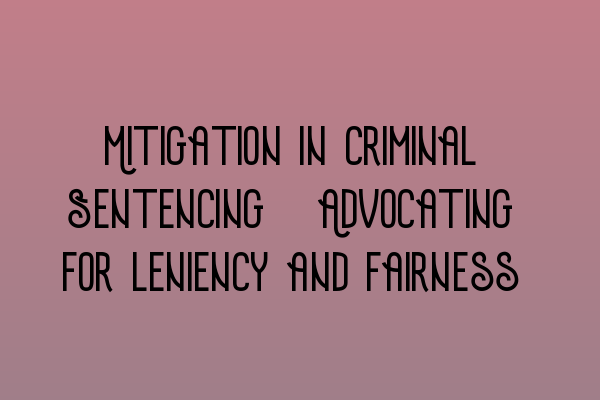Mitigation in Criminal Sentencing: Advocating for leniency and fairness
When it comes to criminal sentencing, the role of mitigation cannot be overstated. Mitigation refers to the process of presenting factors that may justify, excuse, or explain the defendant’s conduct, with the aim of securing a more lenient sentence. It is an essential part of the criminal justice system that allows for fairness and individualized sentencing outcomes.
Understanding the Importance of Mitigation
In criminal cases, the sentencing judge has the difficult task of determining the appropriate punishment for the defendant. This decision is not made arbitrarily but is guided by the principle of proportionality. The goal is to ensure that the punishment is proportionate to the nature and seriousness of the offense committed.
However, each case is unique. Mitigation takes into account the individual circumstances and characteristics of the defendant, recognizing that there may be underlying factors that contributed to the commission of the offense. By presenting these factors effectively, a solicitor can advocate for a more lenient sentence that aligns with the principles of justice.
Some common forms of mitigation include:
- Character references from family, friends, or employers, which highlight the defendant’s positive traits and contributions to society.
- Remorse and efforts towards rehabilitation, such as attending counseling or participating in community service.
- Mental health issues or other personal challenges that may have influenced the defendant’s behavior.
- Cooperation with the police or the prosecution, which may demonstrate acceptance of responsibility and willingness to make amends.
Mitigation is not about seeking to excuse or justify criminal behavior. Instead, it aims to provide a more complete picture of the defendant’s circumstances, allowing the judge to make an informed decision that considers the broader context.
The Role of the Solicitor in Presenting Mitigation
As a solicitor, it is your responsibility to gather and present the relevant mitigation evidence to the court. This involves conducting thorough interviews with the defendant, their family members, and any relevant witnesses. It also requires understanding the legal principles that govern the admissibility and weight of mitigation evidence.
Effective presentation of mitigation involves framing the evidence in a compelling manner that encourages the judge to consider leniency. This includes emphasizing the positive aspects of the defendant’s character, their genuine remorse, and their commitment to rehabilitation. It may also involve highlighting the defendant’s contribution to their community or any actions taken to make amends for their actions.
Linking back to some of our related articles, such as Legal Representation for Delaware LLCs in the UK: Expert Advice and SQE Exam Prep: Essential Study Materials for Aspiring Solicitors, it is important to note that effective mitigation advocacy requires in-depth knowledge of criminal law and procedure. This is where the expertise of a qualified solicitor becomes invaluable.
Ensuring Fair and Just Sentencing
Mitigation plays a crucial role in ensuring that sentencing decisions are fair and just. Without mitigation, judges may rely solely on the facts of the offense, potentially leading to disproportionate sentences that fail to consider the defendant’s individual circumstances.
By effectively presenting mitigation, solicitors contribute to a more balanced and nuanced understanding of the defendant’s case. This, in turn, can lead to sentences that take into account the defendant’s potential for rehabilitation, their previous good character, and any mitigating factors that may have influenced their behavior.
Our recent article on Expert Testimonies in UK Courts: Building Strong Cases explores the importance of presenting persuasive evidence in criminal proceedings, including mitigation. By incorporating expert testimonies and other compelling evidence, solicitors can strengthen their case for leniency.
In Conclusion
Mitigation in criminal sentencing plays a vital role in advocating for fairness and individualized outcomes. It recognizes that each case is unique and seeks to provide the judge with a comprehensive understanding of the defendant’s circumstances. By effectively presenting mitigation, solicitors can help secure a more lenient sentence that aligns with principles of justice.
For aspiring solicitors, understanding the intricacies of mitigation advocacy is crucial. By preparing for the SQE exam, utilizing Demystifying the Solicitors Qualifying Examination Format resources and developing a solid understanding of criminal law, you can enhance your ability to advocate for leniency effectively.
Remember, mitigation is not about excusing or justifying criminal behavior, but about ensuring fair and just outcomes in the criminal justice system.
